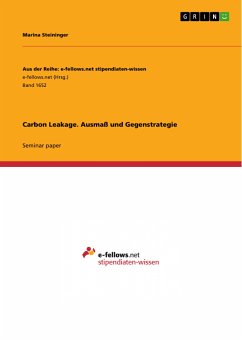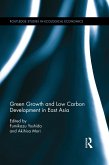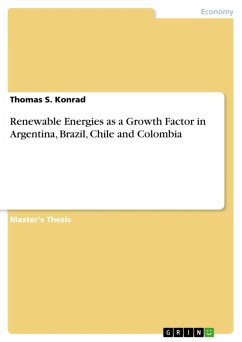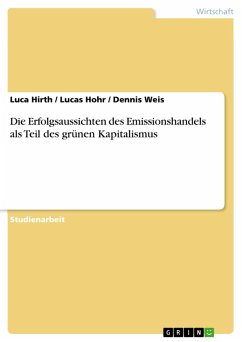Seminar paper from the year 2015 in the subject Economy - Environment economics, grade: 1,0, Vienna University of Economics and Business (Volkswirtschaftslehre), course: Wirtschaftspolitik, language: English, abstract: This paper is a literary based economical analysis of the problem carbon leakage, its extent, arising consequences and possible counter strategies. Today plenty of research on carbon leakage is available. It includes, to name just a few, analyses on influences and extent of carbon leakage (Aichele (2013), Paroussos et.al., (2014), Aiginger, (2013)) and research of first and second-best solutions and possible counter strategies (Aichele (2013), Aroyo-Curras et.al., (2013), Görlach, et.al., (2008)). The purpose of this paper is to investigate extent and counter strategies of carbon leakage. The current climate development is illustrated in the first passage. A brief description is important for efficient subsequent analysis. Following this summary, two major climate actions are introduced in chapter two: the Kyoto Protocol and the European Emissions Trading System. As a consequence of the implementation of unilateral climate approaches, the problem Carbon Leakage arises. When industrialised countries and specifically Europe introduces strict emission standards, costs of production of emission intensive industries rise. As a result of policies like carbon taxation, or the European emissions' pricing system those companies relocate parts of their sectors in countries without high standards. As a consequence the overall emissions might increase. After substantiating the dilemma of efforts concerning climate actions, the actual extent of carbon leakage will be illustrated in chapter three. For this, Aichele (2013) is the main source for empirical proof. Arguments to internalise carbon leakage efficiently are investigated in chapter 4 and 5. Solving the carbon leakage problem will not thoroughly contribute to actual climate goals of the European Union. This paper highlights the importance to concentrate not just on this problem but to tackle down emissions' reduction and carbon leakage in Europe at the same time. Hence several possibilities of policy tools are introduced. It is substantiated that they might work best if you combine them, because each has advantages and disadvantages and addresses different problems. As long as no multilateral approach is implemented, WTO conform border tax adjustments, carbon taxation of domestic production and fostering investment incentives for new energy saving production are illustrated as one possibility to internalise both carbon leakage and an actual reduction of emissions.
Dieser Download kann aus rechtlichen Gründen nur mit Rechnungsadresse in A, B, BG, CY, CZ, D, DK, EW, E, FIN, F, GR, HR, H, IRL, I, LT, L, LR, M, NL, PL, P, R, S, SLO, SK ausgeliefert werden.









